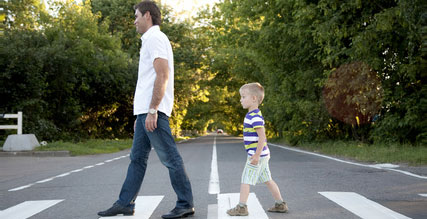Teach Your Kids Street Safety

As a parent, you probably go to great lengths to ensure that your children are safe, secure and well-protected at all times. Most parents tend to adopt safety measures for their kids, which usually include gates, additional locks, burglar alarms and outlet protectors to name a few. However, these measures only protect your child in the house to some extent. What happens when your child steps out, to go to school, or play in the neighborhood park? Can such gadgets and devices keep your child well-protected outdoors too? Unfortunately, they do not, as their uses are limited.
If you really want to maximize your child’s safety and security at all times, the best thing to do is for you to teach him how to protect himself, especially when he is outside the house, on the street. Of course, at the same time, you don’t want to terrify your child by having him believe that the street is a dangerous place and that he is only safe at home. Therefore, when you are trying to teach your kids street safety, you need to strike a balance, so that your kids keep themselves safe, without being scared silly. Given below are a few helpful pointers to bear in mind while trying to create street smart kids -
- First of all, regardless of how old your child is, he should know his parents’ names and his address. If your child is over the age of 4, teach him contact numbers of one or two people can call, in case of an emergency. Since you don’t want your child giving out your name, number and address to everyone, so you can tell him to “keep it a secret” unless he is lost. Some parents also teach their kids how to “dial” their numbers, so when required the child just asks for the phone and dials the parents directly.
- Avoid telling your child things like “never talk to strangers”, as it could make him believe that no one can be trusted. In truth, the percentage of people who would try to hurt a child is quite small, as compared to the number of people who’d try to help your kid, if he were in trouble. What you could say instead, is “most people are good, but there are some who may do bad things, so you have to be very careful before you talk to anyone you don’t know.”
- Let your child know that it is alright to ask some grownups for help, if they are lost or have been injured. Advise them to look for professionals in a uniform, like a police officer or a security guard. Also teach them that they can seek help from a store clerk or even a woman who seems to be the mother of other kids.
- Educate your child about the difference between approaching a person and being approached by someone. While it is acceptable for your child to approach a stranger for help, your child should be wary of an adult who approaches him, offering candy or even asking for help in looking for a lost pet. Ask your child to get as far away as possible from such situations, or even scream to attract attention if necessary.
- It is not always strangers that commit crimes against kids. Statistics show that a vast number of abductions are conducted by those people that the children know, like a baby sitter, a teacher, an estranged spouse, a distant relative and so on. Make your kids realize that not all stranger are bad, but at the same time, they should not have blind faith in all the people they know either.
- Make it absolutely clear to your child that he can call you or talk to you any time he feels scared, confused or threatened by anything. Spend time with your child each day, asking him about his day at school or the day care center to find out what makes your child uncomfortable. Tell him what he should do the next time he is in a situation that he is not very comfy in.
In addition to these tips, you should also make sure that your child is aware of the right rules for walking and riding his bicycle on the street. Educate your child about the importance of staying away from the roads and avoiding road hazards.
Instead of scaring your kids with horror stories, help them become street smart. When it comes to the protection of your kids, it’s better to be safe than sorry.
 7 Must-Haves Before Your Baby Arrives
7 Must-Haves Before Your Baby Arrives Bonding Games for Babies
Bonding Games for Babies DIY Baby Bath Towel Apron
DIY Baby Bath Towel Apron Common Late Pregnancy Fears
Common Late Pregnancy Fears